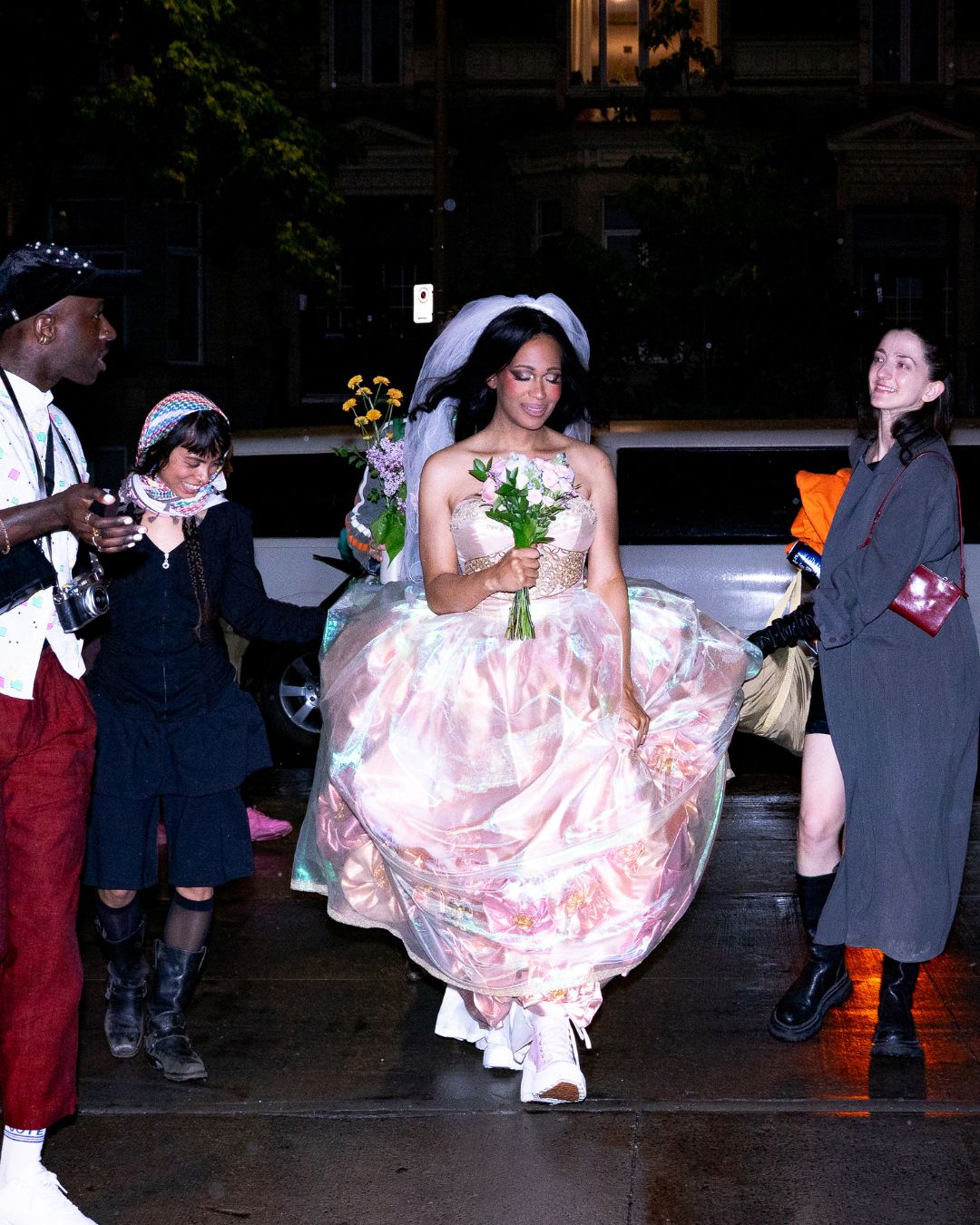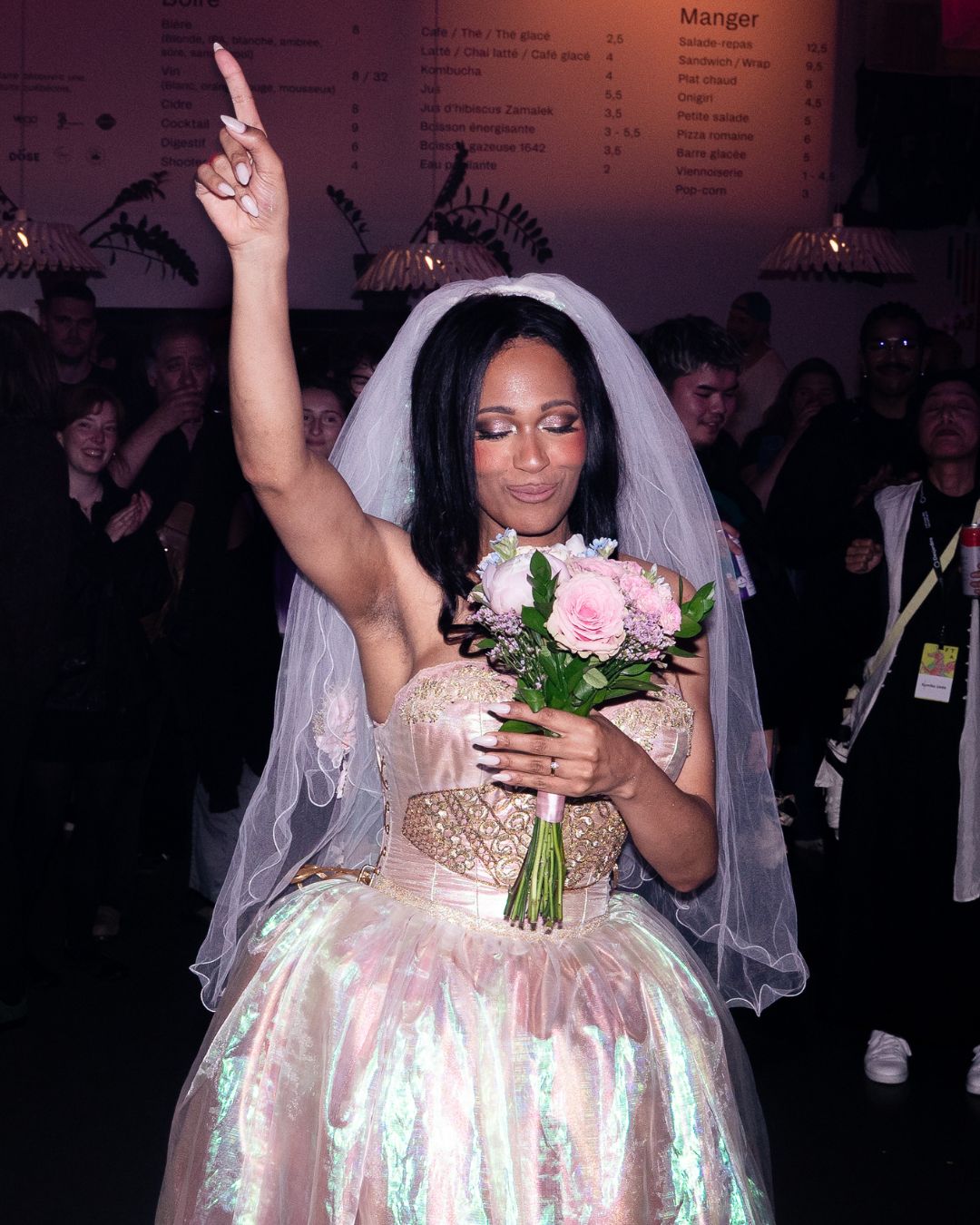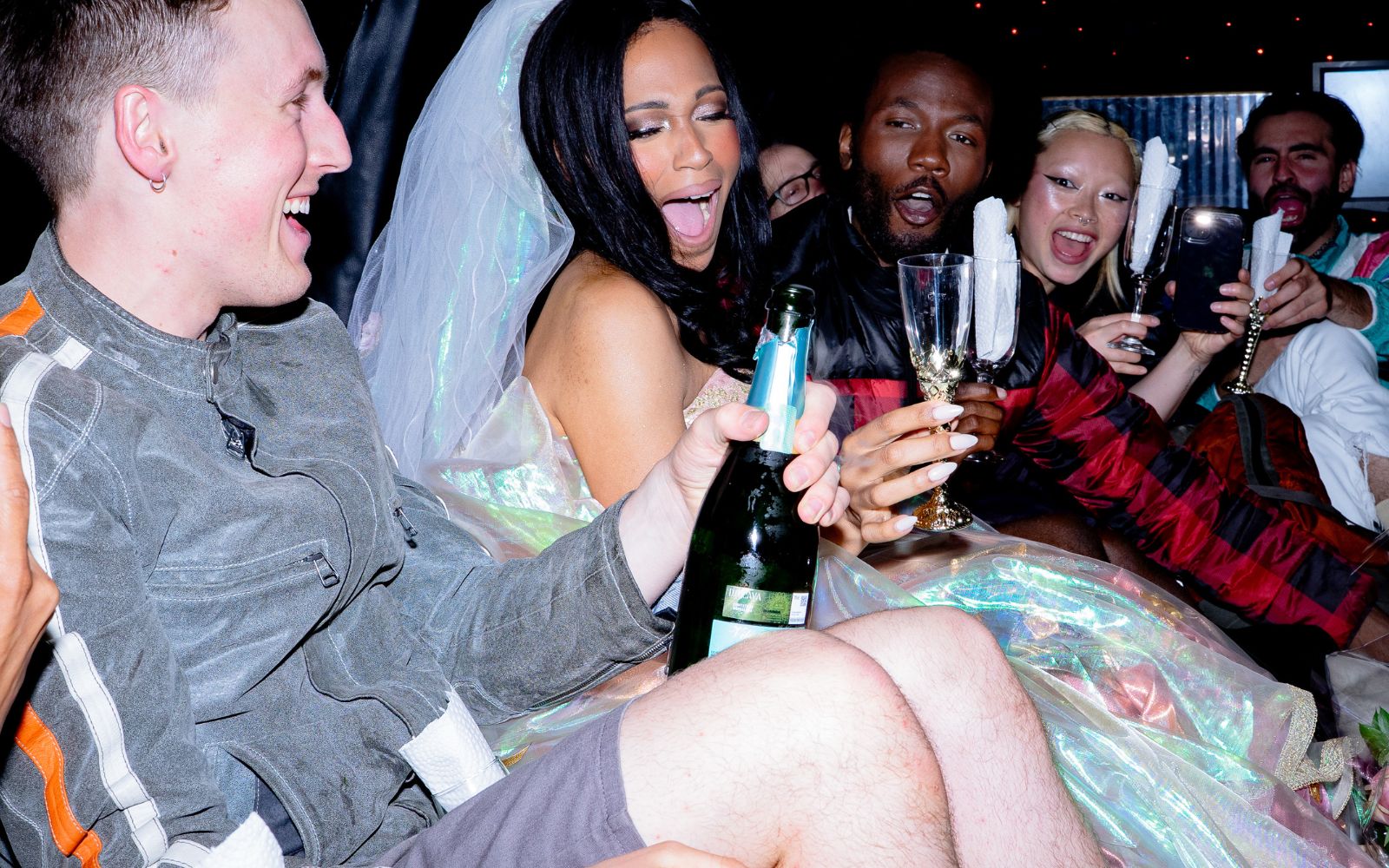By Stephan Boissonneault
With There Is Nothing In The Dark That Isn’t There In The Light, the veteran vocalist leans into intimate, searching folk.
If you’re not familiar with Elle Barbara, you’re missing out. A lot of people are, in my opinion – and hers too. She got her long-deserved flowers via an on-stage appearance with Madonna in January, but to define her by that one night overshadows years of carefully constructed weird and wonderful work. Barbara is an avant-garde musician and visionary artist of many mediums, the mother of the House of Barbara, an organizer and activist, and a local legend to those in the know.

Photo by Laurence Bissonnette
“I love the fact that I’m original. I think it’s one of the qualities I can genuinely claim for myself without being pretentious,” says Barbara. “I have a weirdo thing, a bit of an outsider thing about me, which probably stems from having been raised in a familial environment that was perhaps a bit judgmental and strict.”
As a kid, Barbara went out and explored things on her own, not having older siblings or cousins to point the way to what was “cool.” She found herself, and her tastes, in unlikely places. Coming up in the indie scene around the same time as names like Mac DeMarco, she mingled, mixed, and accumulated influences in alternative and experimental spaces, most of which were overwhelmingly white. The musical project that later crystallized out of that time – Elle Barbara’s Black Space – carves out a sonic space to defy the pigeonholing of Black music.
“When I came on the scene, the whole diversity thing wasn’t big,” explains Barbara, as we’re tucked in a booth at a bar with the music blaring. While she admits she could have churned out an album to seize the moment, she instead took her time to incubate more thoughtful and long-stewing work. “I’m glad I didn’t release an album in that span of time, because I believe that this work speaks for itself.”


Other demands also took hold of Barbara’s life in the season between her last album and her upcoming concept album, Word On the Street – set to be released on June 27 via Celluloid Lunch/Perennial/K Records. She transitioned socially and medically, living on as little as $11 per day. She rose to the occasion to mentor other trans women during the rise of Montreal’s ballroom scene, lent her voice to the Action Santé Travesti(e)s et Transexuel(le)s du Québec (ASTTeQ) and co-created Taking What We Need, a grassroots group getting needed funds into the hands of low-income trans women.
“As I was pushing my gender expression to a more trans feminine place over those years, what grounded me a lot was solidarity work,” says Barbara. “I’ve been spread thin and hustling to pay for studio time, but I always knew that this album was coming.”
The result is something well worth the wait – a cheeky, deliciously strange concoction of alien synths and lyrics. In the same vein as her previous release, “Délice Créole / Peach Purée,” Barbara returns to food as a campy signature. “How the hell can a side of mac ‘n’ cheese be this good?” she coos on the opening track, “Caramelized Onions (You Bet!).”
Working with trusted collaborator Renny Wilson, Barbara was able to craft the unique sound she was going for – one that many struggle to put a finger on, but feel the need to try. She remembers playing a show where Grimes compared her to Prince, a comment she found to be superficial. Growing up, she idolized gay pop icons, and later let her ear for the weird take her to mosh pits and strange parties as a teen. Her listening diet dances from Laurie Anderson to Charles Mingus, from Brian Eno to Mariah Carey. Chatting at the bar, the tingle of Thompson Twins’ “Hold Me Now” comes on, and she says that she loves that too.

Photo by Laurence Bissonnette
“I’ve been told this album sounds a bit like shoegaze… So we did the shoegaze mixing thing, but on the low end,” says Barbara. “Shoegaze is more of a white British thing, but the low end bass-y kind of reggae approach is very Black, very Jamaican.”
Word On the Street is a melange of many influences, but at its core, it’s a concept album. Barbara says she always knew she had this in her, feeling drawn to Ziggy Stardust-esque persona-building and prog storytelling. The album art places Barbara as the weirdo queen of Montreal, above a brawling hockey scene and Montreal landmarks with extraterrestrial nods. “Hitler, Satan & Associates LLP” is a leading single that cements her persona as a gal unafraid to grab your attention through a gotcha moment.
A few months ago, Barbara posted a series of mysterious photos on Instagram teasing an engagement and wedding dress shopping for her impending marriage to the love of her life. She later revealed it would be a wedding to herself – a spoken word, musical, and dance performance produced as part of Festival TransAmériques – and that anyone could buy a ticket.
That’s how I found myself in the pews at the Church of the Holy Redeemer to witness an “act of performative sologamy.” Barbara had told me earlier that she was in part inspired by Four Weddings and a Funeral, if only in name, mashing the two together in an ultimate act of death and rebirth, reborn and formally committed to herself.

Photo by Laurence Bissonnette
“I believe that we’re also in an era of hyper-individualism and narcissism, and we have to be careful not to conflate self love with those pitfalls,” says Barbara. “I want self love to start to be molded around the idea of forgiveness, forgiveness of the self.”
The night began with a woman in a fishtail gown screaming casketside, unleashing short staccato screams of pain like she was being stabbed with grief. Barbara lay unmoving, as a eulogy from an actor playing her absent father followed that she began to respond to from beyond the grave. A priest told the story of Barbara’s life and accomplishments, dancers filed through the pews in mourning veils, and there was even a moment for the crowd to go up to get communion.
Barbara performed “Before and After” off the new album and was reborn, complete with dancers wheeling hospital trolleys through the pews in gowns. The song feels perfectly theatrical – the whole album has a musical soundtrack-like cadence to it at times. The night ended with Barbara walking down the aisle with the longest train you’ve ever seen, going up to vow to herself. We threw fistfuls of confetti from little pouches handed to us. The priest proclaimed that the album was available to buy on vinyl at the back.
“At the beginning of planning the performance I was in my fairytale bag, thinking about who to cast as Prince Charming,” says Barbara. “Then I realized, the one person that I think has the potential and the capacity to be committed to me forever after is myself.”
By Stephan Boissonneault
With There Is Nothing In The Dark That Isn’t There In The Light, the veteran vocalist leans into intimate, searching folk.
By Sam Hendriks
A refined turn toward clarity reveals Melody Prochet at her most grounded and assured.
By Judynn Valcin
Inside the Montréal musician’s shift toward ease, openness, and a sound that refuses to collapse even as it teeters.